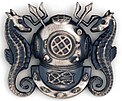This is an old revision of this page, as edited by BrownHairedGirl (talk | contribs) at 00:43, 26 July 2019 (remove links to deleted portals). The present address (URL) is a permanent link to this revision, which may differ significantly from the current revision.
Revision as of 00:43, 26 July 2019 by BrownHairedGirl (talk | contribs) (remove links to deleted portals)(diff) ← Previous revision | Latest revision (diff) | Newer revision → (diff) Qualification badges of the uniformed services of the United States which are awarded to servicemen qualified as divers
The diver insignia (also known as "diver badges") are qualification badges of the uniformed services of the United States which are awarded to servicemen qualified as divers. Originally, the diver insignia was a cloth patch decoration worn by United States Navy divers in the upper-portion of the enlisted service uniform's left sleeve during the first part of World War II, when the rating insignia was worn on the right sleeve. When enlisted rating insignia were shifted to the left sleeve in late World War II, the patch shifted to the upper right sleeve. The diving patch was created during World War II, and became a breast insignia in the late 1960s.
Currently, the United States Navy and the United States Army issue diver insignia and badges denoting degrees of qualification. The United States Coast Guard and United States Marine Corps personnel are eligible to earn most of the naval diver insignia.
United States naval services
 Diving Medical Technician Insignia
Diving Medical Technician Insignia Master Diver Insignia
Master Diver Insignia First Class Diver Insignia
First Class Diver Insignia Second Class Diver Insignia
Second Class Diver Insignia Scuba Diver InsigniaJoint diver insignia of the Navy, Marine Corps, and Coast Guard
Scuba Diver InsigniaJoint diver insignia of the Navy, Marine Corps, and Coast Guard
 Navy Diving Medical Officer Insignia
Navy Diving Medical Officer Insignia Navy & Coast Guard Diving Officer Insignia
Navy & Coast Guard Diving Officer Insignia Marine Corps Combatant Diver Insignia
Marine Corps Combatant Diver Insignia Coast Guard Scuba Diver Officer Insignia
Coast Guard Scuba Diver Officer Insignia NOAA Diver Insignia
NOAA Diver Insignia
United States naval diver insignia are awarded, per degree of qualification, to sailors, marines, and coast guardsmen. The elementary naval diver insignia is the Scuba Diver Insignia, awarded upon qualifying as a basic naval diver. Previously, the Scuba Diver Insignia was awarded in two degrees, one for officers and one for enlisted. The Navy eliminated the Scuba Diver Officer insignia in the 1990s, but it remains in service within the Coast Guard. The silver-colored insignia features an old-fashioned diving mask and open-circuit breathing apparatus.
In 2001, the Marine Corps authorized the creation of a new badge, the Combatant Diver Insignia, attesting to the wearer's closed-circuit rebreather and reconnaissance combat diver training; the gold-colored combatant diver insignia depicts a wetsuit hood, low-profile diving mask, and chest-mounted rebreather.
The naval deep sea diver qualification insignia are awarded in four degrees: second-class diver; first-class diver; master diver; and diving officer. However, the Marine Corps does not award the Diving Officer Insignia to its officers. In the Navy, the master diver is the most qualified diver; he must be a chief petty officer before applying to attend the master diver course.
The Diving Medical Officer Insignia and the Diving Medical Technician Insignia are awarded to naval medical personnel qualified as divers or medical technicians, respectively. The Diving Medical Insignia resembles the Master Diver Insignia, but is decorated with a caduceus. The Diving Medical Officer Insignia is gold in color while the enlisted version—the Diving Medical Technician Insignia—is silver in color. Since the Marine Corps and the Coast Guard have no organic medical officers, they do not issue the Diving Medical Officer Insignia. However, like all medicine, the Marine Corps is served by US Navy Diving Medical Officers and Diving Medical Technicians. The Diving Medical Officers attend their own training course that often has Air Force, Army, and foreign doctors all who, upon completion, wear the Navy Diving Medical Officer insignia. The enlisted Diving Medical Technicians attend the same course as Navy divers training to become second-class divers, but with slight changes to the curriculum for medicine. They enter that class having already trained as Navy hospital corpsmen.
Like the Navy's surface, submarine, and aviation enlisted specialties, dive-qualified enlisted personnel place a term after the sailor’s rating; for example, if Petty Officer Second-Class Jones is dive-qualified, he is referred to, in writing, as PO2 (DV) Jones.
The only non-armed service of the United States that awards diver badges is the National Oceanic and Atmospheric Administration Commissioned Corps (NOAA Corps). NOAA Corps officers qualified as NOAA divers may wear the NOAA Diver Insignia after authorization by the Director of the NOAA Corps. The NOAA Diver Insignia is a gold-colored pin consisting of a NOAA Corps device surrounded by two dolphins.
United States Army
| Diver badges | |
|---|---|
 | |
| Type | Badge |
| Status | Currently awarded |
| Precedence | |
| Next (higher) | Flight surgeon badge |
| Next (lower) | Explosive ordnance disposal badge |
The United States Army issues two different types of diver badges, one for Army engineer diver and one for Army special operations divers. Army engineer diver badges are awarded in four degrees (second-class diver, salvage diver, first-class diver, and master diver) while Army special operations diver badges are awarded in two degrees (diver and diving supervisor). The second-class and first-class diver badges are identical to those issued by U.S. naval forces. The Army does not issue officer or medical diver badges; however, Navy-awarded Diving Officer Insignia, Diving Medical Officer Insignia, and Diving Medical Technician Insignia are authorized for wear on Army uniforms with written approval from the United States Army Human Resources Command.
On 17 September 2004, the Scuba Diver Insignia/Badge was discontinued in lieu of a new Special Operations Diver Badge and an additional grade, the Special Operations Diving Supervisor Badge, was created. Prior to this change, the Scuba Diver Insignia/Badge was the same for all of the U.S. armed forces. The new design includes sharks, symbolizing speed, stealth, and lethal efficiency, and two Fairbairn-Sykes Fighting Knives in saltire, representing the heritage of OSS operational swimmers during World War II. The Army Combat Diver Qualification Course and Army Combat Diving Supervisors Course are taught by Company C, 2nd Battalion, 1st Special Warfare Training Group at the Special Forces Underwater Operations School, Naval Air Station Key West.
United States Air Force

The United States Air Force issues the Scuba Badge to graduates of the Air Force Combat Dive Course at the Navy Diving Salvage and Training Center, Naval Support Activity Panama City. The badge is identical in appearance to the current Navy scuba insignia but with a mirror finish and is the same diver insignia that was once awarded to all special operations divers until the USMC and Army updated their badge in 2001 and 2004, respectively.
Until the U.S. Air Force formed its own Combat Dive Course in 2006, special operations Airmen attended either the U.S. Army Combat Diver Qualification Course or the U.S. Marine Corps Combatant Diver Course. Badges awarded from sister-service combat diver courses, as well as other U.S. Navy dive courses (basic Scuba, Diving Medical Officer, etc.) are authorized for wear on U.S. Air Force uniforms.
See also
- United States military divers – Underwater divers employed by the US armed forces
- Badges of the United States Air Force – Military badges of the U.S. Air Force
- Badges of the United States Army – Military decorations issued by the United States Department of the Army
- Badges of the United States Coast Guard
- Badges of the United States Marine Corps – Military badges of the U.S. Marine Corps
- Badges of the United States Navy – Military badges of the US Navy
- Military badges of the United States
- Awards and decorations of the National Oceanic and Atmospheric Administration
- Obsolete badges of the United States military
References
- ^ U.S. Coast Guard Uniform Regulation, COMDTINST M1020.6F, United States Coast Guard, dated March 2012, last accessed 14 July 2012
- "CHANGES TO DIVER QUALIFICATION REQUIREMENTS, POLICY, AND UNIFORM REGULATIONS FOR RELATED DIVER INSIGNIA". United States Marine Corps. 2002-03-14. Retrieved 2008-11-15.
- ^ U.S. Marine Corps Uniform Regulation MCO P1020.34G, Chapter 4 Archived 2008-10-02 at the Wayback Machine, United States Marine Corps, last updated 29 October 2009, last accessed 14 July 2012
- NOAA Corps Commissioned Personnel Center, NOAA Corps Directives, NOAA Corps, last accessed 13 Nov 11
- Army Regulation 600-8-22 Military Awards (24 June 2013). Table 8-1, U.S. Army Badges and Tabs: Orders of precedence. p. 120 Archived 17 October 2013 at the Wayback Machine
- U.S. Army Regulation 670–1, Uniforms and Insignia, Wear and Appearance of Army Uniforms and Insignia Archived 2015-11-05 at the Wayback Machine, Department of the Army, dated 3 February 2005, rapid action revision dated 11 May 2012, last accessed 14 July 2012
- ^ Army Regulation 600-8-22 Military Awards (24 June 2013). Archived 17 October 2013 at the Wayback Machine
- ^ AR611-75, Management of Army Divers; dated 20 July 2007; retrieved 27 August 2011
- "Diver Badges". Institute of Heraldry. United States Department of the Army. Archived from the original on 2008-06-14. Retrieved 2008-11-15.
{{cite web}}: Unknown parameter|deadurl=ignored (|url-status=suggested) (help) - "Special Forces Underwater Operations" (PDF). John F. Kennedy Special Warfare Center and School. United States Army. 2007-07-05. Retrieved 2008-11-16.
- ^ AFI36-2903: Dress and Personal Appearance of Air Force Personnel, dated 18 July 2011, last accessed 21 August 2011
- First Air Force dive course graduates 17 Airmen, U.S. Air Force, by Chrissy Cuttita, dated 16 March 2006, last accessed 11 November 2017
| Badges of the United States Army | |
|---|---|
| Special Skill Group 1 | |
| Special Skill Group 2 | |
| Special Skill Group 3 | |
| Special Skill Group 4 | |
| Special Skill Group 5 | |
| Special Skill Group 6 | |
| Identification | |
| National Guard and Other | |